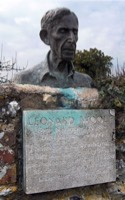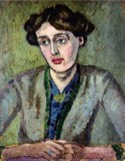Clement-Jones family - Person Sheet
Clement-Jones family - Person Sheet
Spouses
1(Adeline) Virginia STEPHEN  , 7835
, 7835
 , 7835
, 7835Birth1882
Death1941
FatherSir Leslie STEPHEN KCB , 7834 (1832-1904)
MotherJulia Prinsep JACKSON , 7833 (1846-1895)
Notes for Leonard WOOLF
Leonard Sidney Woolf (25 November 1880 – 14 August 1969) was an English political theorist, author, publisher and civil servant, and husband of author Virginia Woolf.
Contents [hide]
Early life
Woolf was born in London, the third of ten children of Solomon Rees Sydney, a Jewish barrister and Queen's Counsel and Marie (née de Jongh). After his father died in 1892, Woolf was sent to board at Arlington House School near Brighton, Sussex. From 1894 to 1899 he attended St Paul's School in London, and in 1899 won a classical scholarship to Trinity College, Cambridge,[1] where he was elected to the Cambridge Apostles. Other members included Lytton Strachey, John Maynard Keynes, G.E. Moore and E. M. Forster, as well as Bertrand Russell. Thoby Stephen, Virginia Stephen's brother, was friendly with the Apostles, though not a member himself. Woolf was awarded his B.A. degree in 1902 but stayed for a fifth year to study for the civil service examination.
In October 1904 Woolf moved to Sri Lanka to become a cadet in the Ceylon Civil Service, in Jaffna and later Kandy,[2] and by August 1908 was named an assistant government agent in the Southern Province, where he administered the District of Hambantota. Woolf returned to England in May 1911 for a year's leave. Instead, he resigned in early 1912 and that same year married Adeline Virginia Stephen (Virginia Woolf).
As a couple, Leonard and Virginia Woolf became influential in the Bloomsbury group, which also included various other 'Apostles'.
]Writing
After marriage, Woolf turned his hand to writing, publishing in 1913 his first novel, The Village in the Jungle, based on his years in Sri Lanka. A series of books was to follow at roughly two-year intervals. On the introduction of conscription in 1916 during World War I, Woolf was rejected for military service on medical grounds, and turned to politics and sociology. He joined the Labour Party and Fabian Society and became a regular contributor to the New Statesman. In 1916 he wrote International Government, proposing an international agency to enforce world peace.
As his wife began to suffer greatly from mental illness, Woolf devoted much of his time to caring for her (Leonard Woolf himself suffered with depression/mental illnesses). In 1917 the Woolfs bought a small, hand-operated printing press; with it they founded the famous Hogarth Press. Their first project was a pamphlet, hand-printed and bound by themselves. Within ten years, the Press had become a full-scale publishing house with a highly distinguished authors list. Woolf continued as its director until his death. His wife's mental problems continued, however, until her suicide in 1941. After Virginia Woolf's suicide, Leonard fell in love with a married artist, Trekkie Parsons.
In 1919 Woolf became editor of the International Review, and edited the international section of the Contemporary Review (1920–1922). He was literary editor of Nation Athenaeum (1923–1930), joint editor of The Political Quarterly (1931–1959), and for a time served as secretary of the Labour Party's advisory committees on international and colonial questions.
In 1960, Woolf revisited Sri Lanka and was surprised at the warmth of the welcome he received, and even the fact that he was still remembered, according to E.F.C. Ludowyk in his introduction to The Village in the Jungle.[3]. Woolf accepted an honorary doctorate from the then new University of Sussex in 1964 and in 1965 was elected a Fellow of the Royal Society of Literature, but declined the CH in the Queen's Birthday honours list in 1966.[1]
[edit]Family
Among his nine siblings Bella was also an author.
[]Death
Woolf died on 14 August 1969 and was cremated with his ashes being buried beneath an elm tree in his beloved garden at Monk's House, Rodmell, Sussex. (The tree subsequently blew down; Woolf's remains since have been marked by a bronze bust). His papers are held by the University of Sussex at Falmer.
[edit]
Contents [hide]
Early life
Woolf was born in London, the third of ten children of Solomon Rees Sydney, a Jewish barrister and Queen's Counsel and Marie (née de Jongh). After his father died in 1892, Woolf was sent to board at Arlington House School near Brighton, Sussex. From 1894 to 1899 he attended St Paul's School in London, and in 1899 won a classical scholarship to Trinity College, Cambridge,[1] where he was elected to the Cambridge Apostles. Other members included Lytton Strachey, John Maynard Keynes, G.E. Moore and E. M. Forster, as well as Bertrand Russell. Thoby Stephen, Virginia Stephen's brother, was friendly with the Apostles, though not a member himself. Woolf was awarded his B.A. degree in 1902 but stayed for a fifth year to study for the civil service examination.
In October 1904 Woolf moved to Sri Lanka to become a cadet in the Ceylon Civil Service, in Jaffna and later Kandy,[2] and by August 1908 was named an assistant government agent in the Southern Province, where he administered the District of Hambantota. Woolf returned to England in May 1911 for a year's leave. Instead, he resigned in early 1912 and that same year married Adeline Virginia Stephen (Virginia Woolf).
As a couple, Leonard and Virginia Woolf became influential in the Bloomsbury group, which also included various other 'Apostles'.
]Writing
After marriage, Woolf turned his hand to writing, publishing in 1913 his first novel, The Village in the Jungle, based on his years in Sri Lanka. A series of books was to follow at roughly two-year intervals. On the introduction of conscription in 1916 during World War I, Woolf was rejected for military service on medical grounds, and turned to politics and sociology. He joined the Labour Party and Fabian Society and became a regular contributor to the New Statesman. In 1916 he wrote International Government, proposing an international agency to enforce world peace.
As his wife began to suffer greatly from mental illness, Woolf devoted much of his time to caring for her (Leonard Woolf himself suffered with depression/mental illnesses). In 1917 the Woolfs bought a small, hand-operated printing press; with it they founded the famous Hogarth Press. Their first project was a pamphlet, hand-printed and bound by themselves. Within ten years, the Press had become a full-scale publishing house with a highly distinguished authors list. Woolf continued as its director until his death. His wife's mental problems continued, however, until her suicide in 1941. After Virginia Woolf's suicide, Leonard fell in love with a married artist, Trekkie Parsons.
In 1919 Woolf became editor of the International Review, and edited the international section of the Contemporary Review (1920–1922). He was literary editor of Nation Athenaeum (1923–1930), joint editor of The Political Quarterly (1931–1959), and for a time served as secretary of the Labour Party's advisory committees on international and colonial questions.
In 1960, Woolf revisited Sri Lanka and was surprised at the warmth of the welcome he received, and even the fact that he was still remembered, according to E.F.C. Ludowyk in his introduction to The Village in the Jungle.[3]. Woolf accepted an honorary doctorate from the then new University of Sussex in 1964 and in 1965 was elected a Fellow of the Royal Society of Literature, but declined the CH in the Queen's Birthday honours list in 1966.[1]
[edit]Family
Among his nine siblings Bella was also an author.
[]Death
Woolf died on 14 August 1969 and was cremated with his ashes being buried beneath an elm tree in his beloved garden at Monk's House, Rodmell, Sussex. (The tree subsequently blew down; Woolf's remains since have been marked by a bronze bust). His papers are held by the University of Sussex at Falmer.
[edit]


